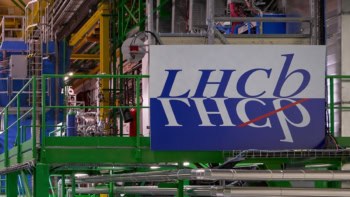
On Sunday millions of Germans will cast their votes in a federal election that will determine Germany’s chancellor for the next four years. First elected chancellor in 2005 and re-elected in 2009, physicist Angela Merkel will be expecting strong support from scientists and educators, feeling that she has done plenty during the past eight years to keep them happy. Recent polls put Merkel’s centre-right CDU/CSU union in the lead with around 40% of the vote.
Merkel originally studied physics at the University of Leipzig from 1973 to 1978 before completing her doctoral thesis on the reactions of hydrocarbons in 1986. She entered politics after the Berlin Wall fell in 1989 and has supported science during her eight years as chancellor. According to the research and education ministry, federal funding for R&D has rocketed by about 60% during that period – from €9bn in 2005 to €14.5bn now. The ministry also says that federal spending on education rose by 70% to €7.3bn in the seven years to 2012 compared with a 30% rise from €3.3bn from 1995 to 2005.
Thomas Mannel, a theoretical particle physicist at the University of Siegen, says that one of Merkel’s most significant contributions is her support for the Excellence Initiative, which is designed to produce internationally recognized universities in Germany that can match rivals in the UK and US. Merkel launched the programme in 2007 with €1.9bn for the first five years and it was renewed in 2012.
Germany now has 11 Ivy-League-style universities receiving top-up funding. “The positive side is that it was real money for the universities,” Mannel says. “The negative side is that the university landscape is changing because of this and students tend to go to the ‘excellence’ universities.”
Doing more
Condensed-matter physicist Kurt Binder from Johannes Gutenberg University Mainz sees Merkel’s “most important achievement” as the Pact for Research and Education. The pact, agreed between the federal government and Germany’s 16 states, provides annual funding increases of 5% from 2011 through 2015 for the Fraunhofer Society, the Helmholtz Association, the Max Planck Society, the Leibniz Association and the German Research Association. “This exceeds inflation and improved the situation of these institutions,” Binder says.
Since Merkel has a PhD in physics, I would have expected a more active role in favour of science and education
Kurt Binder from Johannes Gutenberg University Mainz
However, Binder believes that Merkel should do more to improve all universities in Germany, not just those in the top tier. The problem is that universities are primarily funded by the federal state in which they are located, but many are in financial trouble. “Since Merkel has a PhD in physics, I would have expected a more active role in favour of science and education,” Binder says. “She acts more or less like other ordinary politicians: the next election is the only thing that counts.”
Binder adds that Merkel’s re-election would not necessarily be “something good” for science and education, but fears worse damage if the Social Democrats and the Greens formed a coalition government. Mannel agrees, thinking ongoing stable funding is more likely under Merkel. “The chances for such a scenario are better if she were to be re-elected,” he says.
One issue that has been conspicuously absent during the election campaign is Merkel’s decision in 2011 to close down Germany’s 17 nuclear reactors by 2022. That decision – taken in the wake of Japan’s Fukushima nuclear accident – was generally supported across the political spectrum and by most Germans, who strongly support renewable energy sources. What might happen after the election as 2022 approaches is uncertain. But any government that reverses the decision would risk the wrath of voters.



